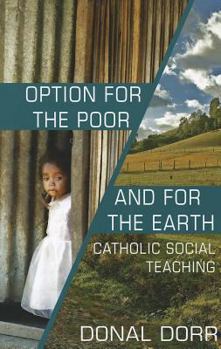Option for the Poor and for the Earth: Catholic Social Teaching
Select Format
Select Condition 
Book Overview
This expanded and revised edition of Donal Dorr's classic Option for the Poor, which focuses on Catholic social teaching on economic inequality, includes five new chapters: the equality and... This description may be from another edition of this product.
Format:Paperback
Language:English
ISBN:157075974X
ISBN13:9781570759741
Release Date:July 2012
Publisher:Orbis Books
Length:500 Pages
Weight:1.60 lbs.
Dimensions:1.4" x 6.1" x 9.3"
Customer Reviews
1 rating
best introduction to catholic social teaching
Published by Thriftbooks.com User , 21 years ago
In a little over one hundred years, the Catholic Church has undergone a remarkable transformation, from an ecclesiastical model in which the Church is Mater et Magistra, to cite the opening words of the first social encyclical of John XXIII, so that "the Church allies itself with the dominant classes that control the state, organizing projects around these classes, giving rise to colleges, universities, Christian political parties, and the like," to quote Leonardo Boff, one of the key spokesmen of the theology of liberation. Boff continues, "A vast network of assistance programs are established, leading the Church to become a Church for the poor rather than a Church with or of the poor." Such a conception of the Church as the intermediary par excellence for the poor as an object of charity ultimately derives from the Church-State alliance of the fourth century A.D. and is manifested in the saints as icons of the Church, such as Mother Teresa of Calcutta, St. Vincent de Paul, or St. Peter Claver, who devoted their lives to ministering to the poor and the slaves, respectively, yet did not actively work to change the existing social and political order that was very much the source of their unfortunate condition.This social and political understanding of the condition of the poor pervades the teaching of the Church until the watershed 1891 encyclical of Leo XIII, Rerum Novarum, which criticizes the ideologies and systems that are the source of injustice in industrial society and calls for structural changes, so that, very significantly, the Church for the first time seeks to address the condition of the poor by a means very different from simply the giving of alms, in the metaphorical sense, by bringing about social and political change on a societal scale. One major culmination of this theological reorientation is the key phrase, "preferential option for the poor," found in the documents of the 1979 Conference of Latin American Bishops at Puebla, Mexico, to express a sea change in the imperative by which the institutional Church sees itself in ministry to the poor. Also often cited is the statement located in the document issued by the 1971 Synod of Bishops, Justice in the World: "Action on behalf of justice and participation in the transformation of the world fully appear to us as a constitutive dimension of the preaching of the Gospel, or in other words, of the Church's mission for the redemption of the human race and its liberation from every oppressive situation." Such a change in "Catholic ethos," to use Dorr's words, may be found in notable contemporary figures such as Dorothy Day and Thomas Merton, for whom action on behalf of social justice were understood to be an integral part of their call to live out their Catholic faith, in particular, the injunction to exercise charity toward others. Donal Dorr, an Irish missionary priest, discusses with clarity this by no means linear transformation in religious ideology, ending with the extra






